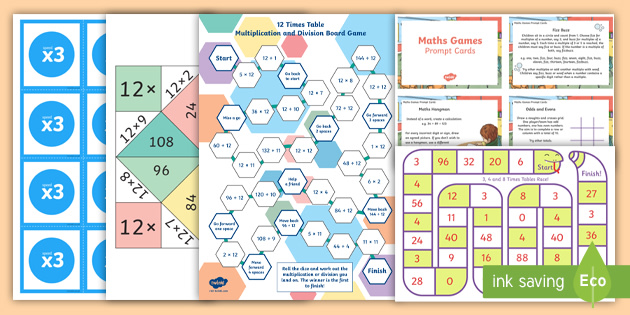


The children can complete as many of these as possible as a timed challenge. Pupils will problem solve using the times tables, learn to spot mathematical patters and work with basic algebra.The process also supports children’s understanding of the relationship between the different times tables (eg 2 and 4 times tables and 3 and 6 times tables).This resource contains full-page, A4 illustrated multiplication tables for numbers 2 to 9 on separate sheets, with colourful accompanying graphics that includes tractors, bees, hot air balloons and apples.3 | Two, five and ten times tables challenge packThis Times Tables Challenge Pack provides children with a term’s worth of practice on recalling multiplication facts for their 2, 5 and 10 times tables.The pack contains 13 sheets of 60 problems. There are layers of challenge to support children as their knowledge of the times tables grows. Beginning with the two times table, the activities and questions carefully build children’s understanding of and confidence with the times tables.Starting with pictoral examples, the problems move on to the abstract. 1 | Maths mastery worksheets for times tables 2-10Take a mastery approach to teaching the times tables with these nine worksheets.
A cheat sheet – reminding pupils of a rule for the times table Investigation – Questions related to the rules of the times table and real-life problems involving the times table Practice questions – questions on the recall of multiplication and division facts related to the times table Visual Introduction – a visual explanation of how the times table uses repeated counting
1 rapid-recall sheet of 60 times table questions. The sheet for more able pupils includes links to other areas of maths. These include practice, questioning and problem-solving questions.
Math Games For Multiplication Tables Free If You
You’ll only need simple things like number cards and dice, so they’re quick to set up, teach, play and pack away. Once the same question has come up a few times you’ll notice how quickly you’ve internalised the answer.Having trouble getting your learners to retain their multiplication tables? Try a different approach using these videos of handy times tables tricks.7 | Multiplication and division activities for KS1&2NRICH is a great go-to source for mathematical activities, so here you’ll find loads for both primary key stages, such as Forgot the Numbers which explores the relationship between multiplication and division, Trebling which looks at place value and Spiders and Flies which asks how many of each minibeast there are if there are 22 legs on the web.Click here for Key Stage 1 and Key Stage 2.Help your pupils develop a solid grasp of the 1x, 2x, 5x and 10x times tables through visual indications and pattern recognition, with this lesson plan for KS2 maths and pupils with SEN, from Judy Hornigold.This PDF features four quick and easy games for children to work on their maths skills. Race against the clock to answer as many questions correctly as possible and reinforce your multiplication learning.You can choose to be given sums to select the correct answer, or be given an answer to which you need to find the right sum. An investigation related to the times table.Each pack costs £3.99, but the 7 times table pack is free if you want to see exactly what you get inside.This quick-fire game from Top Marks can be played using times tables up to 10 or 12, focusing on one particular times table or using a mix of sums from all of them.
There are 5 sheets for each one too, so (20 sheets in all).You’ll also find online activities and links to related sites.While not resources, these features contain loads of handy ideas and advice that can help you teach times tables: i | Help children memorise times tables by encouraging them to make connectionsWant to ensure multiplication tables don’t become a sticking point?Ii | Ten ways to engage parents in teaching times tablesDespite them being a fundamental mathematical tool, many students leave primary unable to recite times tables to 12.This piece from helps you encourage parents/carers to get involved at home.Iii | Bring multiplication tables to life with real-world examplesTimes tables are more important than just memorising sums, they can form the memorable groundwork for children’s greater mathematical understanding…if taught right.This article from Karen Wilding can make sure that’s the case.


 0 kommentar(er)
0 kommentar(er)
